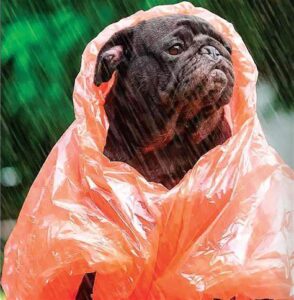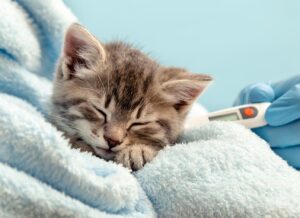Monsoon illnesses in this season is always a worry. Monsoon brings much-needed relief from the scorching summer heat, but it also introduces a host of health challenges for our beloved pets. The increased humidity and damp environment create an ideal breeding ground for various diseases. Pets, particularly dogs and cats, are susceptible to a range of illnesses during this season, including skin infections, gastrointestinal issues, respiratory problems, and parasitic infestations. Understanding these common monsoon illnesses is the first step towards ensuring your pet’s health and well-being. By being proactive and attentive, you can safeguard your pet from these seasonal health hazards and keep them comfortable and happy throughout the rainy season.

Skin Infections: Causes and Care
Skin infections are highly prevalent during the monsoon due to the moist and humid conditions. These conditions can lead to the proliferation of fungal and bacterial infections. Pets, especially those with thick fur, are at greater risk as moisture gets trapped in their coats. Symptoms of skin infections include itching, redness, rashes, hair loss, and a foul odor. To prevent skin infections, it is crucial to keep your pet’s fur dry and clean. Regular grooming is essential, and you should ensure that your pet is thoroughly dried after exposure to rain or damp conditions. Using antifungal powders can help keep the skin dry and prevent infections. Additionally, providing a clean and dry resting place for your pet is vital. If you notice persistent symptoms or if the infection seems severe, consult your veterinarian for appropriate antifungal or antibiotic treatments. Early intervention can prevent the condition from worsening and ensure a quick recovery.

Gastrointestinal Issues: Prevention and Treatment
The monsoon season can upset your pet’s digestive system, leading to gastrointestinal issues such as diarrhea and vomiting. Contaminated water and food are common culprits, as the wet conditions can promote bacterial growth. To prevent these issues, ensure your pet has access to clean, fresh drinking water at all times. Avoid feeding them stale or wet food that could harbor bacteria. Instead, opt for fresh, high-quality pet food. If your pet shows signs of mild gastrointestinal distress, fasting them for 12-24 hours can help their system reset. Following the fast, introduce bland food like boiled chicken and rice to ease their digestive tract. However, if the symptoms persist or worsen, it is crucial to seek veterinary advice. Deworming your pet regularly during the monsoon is also important, as parasitic infestations can exacerbate gastrointestinal problems. Maintaining good hygiene and a clean feeding area can further reduce the risk of infections.

Respiratory Problems: Symptoms and Solutions
The damp and cool weather during the monsoon can lead to respiratory issues in pets. Symptoms of respiratory problems include coughing, sneezing, nasal discharge, and difficulty breathing. These symptoms can be exacerbated by mold and mildew in the environment, which thrive in humid conditions. To protect your pet, keep them warm and dry, especially after walks in the rain. Using a raincoat for dogs can prevent them from getting wet and reduce the risk of respiratory infections. Ensure that their living area is free from drafts and mold and maintain good ventilation. If respiratory symptoms persist, a visit to the vet is necessary. The veterinarian may prescribe antibiotics or other medications to treat the infection and alleviate symptoms. Additionally, steam inhalation and nebulization can be helpful in easing respiratory distress in pets, but these should only be done under veterinary supervision.

Parasitic Infestations: Identification and Control
The monsoon season increases the risk of parasitic infestations in pets. Ticks, fleas, and worms thrive in humid conditions and can cause severe discomfort and health issues for your pet. Regularly checking your pet for ticks and fleas, especially after walks or outdoor activities, is crucial. Use vet-recommended anti-parasitic treatments such as spot-on solutions, collars, and shampoos to keep these pests at bay. Maintaining a clean-living environment, including regularly washing your pet’s bedding and vacuuming carpets, can further reduce the risk of infestations. Deworming your pet according to the veterinarian’s schedule is essential during this season. If you notice signs of parasitic infestations such as excessive scratching, hair loss, visible parasites, or changes in appetite, consult your vet immediately for appropriate treatments. Early detection and prompt treatment can prevent complications and ensure your pet remains healthy and comfortable.

Conclusion
Taking extra care of your pets during the monsoon season is essential to keep them healthy and happy. By being aware of the common monsoon illnesses and their remedies, you can provide better care and prevent serious health issues. Always consult your veterinarian for any persistent symptoms and follow their advice for treatments and preventive measures. Ensuring a clean and dry environment, maintaining good hygiene, and being vigilant about your pet’s health can go a long way in protecting them from monsoon-related illnesses. Your proactive efforts will help your pets enjoy the rainy season without compromising their well-being.
Utpal Khot
Copyright © Utpal K
1. If you share this post, please give due credit to the author Utpal Khot
2. Please DO NOT PLAGIARIZE. Please DO NOT Cut/Copy/Paste this post
© Utpal K., all rights reserved.
Copyright Notice: No part of this Blog may be reproduced or utilized in any form or by any means, electronic or mechanical including photocopying or by any information storage and retrieval system, without permission in writing from the Blog Author Utpal Khot who holds the copyright.





